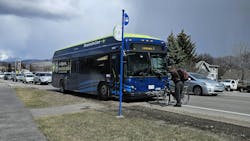The Trek to a Fully Zero-Emissions Bus Fleet; Mountain Line’s Story
In the heart of Montana, where snowy winters and freezing temperatures are more common than not, Mountain Line is on a mission to make a full transition to a zero-tailpipe-emissions bus fleet. The transition from diesel-powered buses to electric is part of the agency’s larger effort to reduce carbon emissions and improve air quality. However, in a state where temperatures can plummet to -20°F or lower and where snowstorms are frequent, the move to electric buses comes with a set of unique and challenging hurdles.
When Mountain Line first took interest in battery-electric bus (BEB) technology in 2015, the agency wanted to invest in the idea of operating a fleet of buses that helped to reduce the agency’s carbon footprint. Mountain Line found that electric buses consume less energy per mile than buses using other common propulsion technologies, such as gasoline, diesel and natural gas engines.
In 2017, Mountain Line was awarded a Low- or No-Emission Grant from the U.S. Department of Transportation to purchase six Proterra BEBs, which were the top BEB technology of its time, according to Mountain Line Director of Operations Jennifer Sweten. Mountain Line wanted to test the efficiency of an electric bus while operating in a colder climate.
Sweten says the agency began to see range issues with its Proterra BEB pilot within the first six months.
“We took delivery of the buses in the summer of 2019, then in 2020, we were seeing range issues that were cutting our range in half at a warmer temperature than we were expecting, which was about 20°, but we were making it work,” Sweten noted.
To address this issue, Mountain Line worked closely with bus manufacturers to develop solutions that would help ensure the fleet would run efficiently in the cold. This included incorporating heated battery systems to maintain optimal temperature levels and testing buses in similar conditions to Missoula's winter weather.
While cold-weather performance tests were promising, the risk of a shorter range on icy roads or increased power consumption during subzero temperatures remained a concern. The agency had to develop strategies to ensure buses could complete their routes without running out of charge too early.
Mountain Line kept its diesel buses on constant standby to ensure efficiency in operations while testing its BEB technology. Sweten says this was a part of Mountain Line’s efforts to determine where the BEBs would be most reliable and what scheduled service routes would become too taxing on the Proterra BEBs.
The agency saw that despite the Proterra BEBs' shortcomings in range, a BEB fleet was still something that could be possible with the right kind of technology improvements.
Cold weather study
In 2020, the Missoula Urban Transportation District Board of Directors, the governing body of Mountain Line, passed a resolution to achieve a zero-tailpipe-emissions fleet by 2035, setting the agency’s initiative in stone. Mountain Line went full steam ahead with its endeavor, launching a cold weather study and adding two GILLIG and two New Flyer BEBs to its growing fleet. The agency also used $1 million in Volkswagen settlement dollars to purchase two more GILLIG buses.
These buses were put through a year-long study that evaluated the performance of BEBs in cold weather, particularly their battery efficiency, range and heating capabilities, while also analyzing charging behavior in freezing temperatures. This study allowed the agency to assess the real-world feasibility of operating BEBs in a cold climate while ensuring reliability and efficiency during peak winter conditions.
To monitor the study, Sweten says Mountain Line installed the same monitoring software on all its buses as a part of this study. The Center for Transportation and the Environment helped Mountain Line to understand how cold temperatures would impact the buses' range, charging times and overall performance, ensuring they could operate reliably year-round in Missoula’s frigid temperatures.
Sweten notes Mountain Line’s transit dispatchers played a major role in monitoring the buses and taking in real-world data while they were being tested out in the field.
Operating in the extremes
Mountain Line also focused on each bus brand’s capabilities. The agency’s cold weather study found that GILLIG’s 686 model achieved full feasibility with 26 runs. The study also showed that New Flyer’s bus performed well, with a generally high count of feasible runs in very cold conditions. Proterra and GILLIG’s 444 model had slightly fewer feasible runs, with limitations in colder temperature ranges.
Sweten says that the BEBs’ schedules were altered with the current weather situations in mind.
“We had to adapt on the fly,” Sweten noted.
When buses were experiencing slippery roads during icy weather, the agency had to alter schedules because so much of the range that could have been achieved by the BEBs through regenerative braking was compromised when the bus automatically shut down its regenerative braking, according to Sweten.
Preparing the team
To ensure its team was equipped to keep up with the maintenance of the BEBs, Mountain Line worked to beef up its procedures and protocols.
“We bought into the lie at the very beginning that at the end of the day [a BEB] is just a bus, and at the end of the day, it's so much more than a bus,” Sweten said.
Mountain Line worked to educate its mechanics on high-voltage safety protocols, battery diagnostics, thermal management and electric drivetrain maintenance. The agency also relied on its collaboration with original equipment manufacturers for hands-on training.
The agency says it also worked to train its drivers on efficient acceleration, regenerative braking and energy conservation techniques to maximize range. This also helped to improve operators’ understanding of the bus technology’s capability.
Committed to the cause
Mountain Line is currently fully committed to its 100 percent zero-emissions fleet despite current uncertainties in federal funding. Sweten says the agency will become a 90 percent zero-emissions fleet in the coming months thanks to incoming BEBs and infrastructure. The agency also has plans in place to build a new maintenance, operation and administrative base, along with a new home for its vehicles. By May of this year, the agency will have 26 BEBs in its fleet.
With the current political climate in the U.S., and the recent increase in foreign tariffs, agencies that have invested in zero-emission technologies are already feeling the pinch. Mountain Line has plans in place to continue its mission but knows the reality of operating in the current climate.
“While we're committed to battery electric currently and are very close to 100 percent, we are not saying that we're dedicated to it for an eternity. We're open to what the future holds,” Sweten said.
About the Author
Eman Abu-Khaled
Associate Editor
Eman Abu-Khaled is a former associate editor with Mass Transit magazine.

